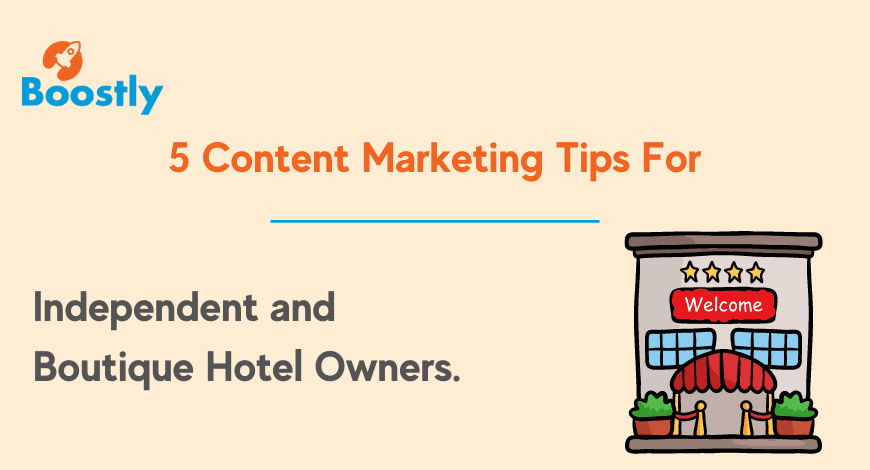It’s no secret that boutique hotels and vacation rentals are incredibly competitive. Now more than ever, it's important that the website for your boutique hotel finds a way to uniquely distinguish itself from the competition while effectively connecting with as many individuals as possible.
Content marketing, a vital component of vacation rental web design and modern social media marketing, gives hotels the ability to relay their brand, values, and information to interested travellers.
Given the recent rise in the importance of web design and online marketing, all boutique hotel and vacation rental owners need to invest their time and money into developing their digital content and website assets.
Here are five content marketing tips for independent boutique hotel websites.
On the move? Watch and listen here:
1. Identify your brand
What kind of boutique hotel do you run? Is it a rustic, B&B-style space or more of a hip, modern lounge designed to host a younger crowd? Make sure that you have your brand clearly identified before developing content.
Here are some key steps to identify and develop your brand.
Define your brand
Define your brand's personality, values, mission, and vision. This helps you establish a clear idea of your boutique hotel's values.
Avoid immature or temporary trends. Go for a brand identity that will last and continue to be meaningful when your web design and boutique hotel are ten years down the road.
Conduct market research
Conduct market research to gain insights into your key demographic audience and their preferences. This will help you to imagine a brand identity that appeals to your target market.
Create the visual identity of your brand.
Your brand's visual identity includes the website logo, typography, colour scheme, and imagery used across the web design of your vacation rental to represent your brand.
These elements should be consistent across the web design of your boutique hotel and all other on and offline marketing materials to create a cohesive brand image.
Create a brand messaging strategy.
Develop a brand messaging strategy throughout your website that communicates your brand's value proposition, key messages, and unique selling points.
This strategy should be used consistently across all marketing channels.
Establish Your brand guidelines.
Create brand guidelines for your boutique hotel or vacation rental that outline how your brand should be represented in various marketing channels.
This helps to ensure consistency and maintain a strong brand identity.
Launch and promote your brand.
Once you have developed your brand identity, it's time to launch and promote it through various marketing channels. This includes social media, advertising, content marketing, and other tactics to help build brand awareness and recognition.
Evaluate and evolve your brand identity.
As your boutique hotel business grows and evolves, your brand identity may need to change to reflect new goals, audiences, or trends.
It's important to regularly evaluate your brand identity and make changes as needed to maintain relevance and effectiveness in the vacation rental industry.

Evaluating the brand identity of your boutique hotel web design means assessing how well your target audience perceives your brand and whether it accurately represents your business.
Here are the key steps to evaluating your boutique hotel and, more broadly, any vacation rental or B&B brand identity:
1. Review brand guidelines
Review your brand guidelines to ensure they are followed consistently across all marketing channels. This includes your logo, typography, colour scheme, and imagery.
If any inconsistencies are found, update your guidelines and communicate the changes to your team.
2. Conduct market research
Conduct market research to understand how your target audience perceives your brand. This can be done through surveys, focus groups, or social media listening.
Use this information to identify areas where your website's brand may need improvement or to adjust your messaging strategy through content marketing to better resonate with your audience.
3. Analyze brand metrics
Analyze your brand metrics, such as the traffic of your direct booking website, social media engagement, and sales data.
Look for trends and patterns indicating a need to adjust your brand identity or marketing strategy.
4. Monitor brand reputation
Monitor your brand reputation online by tracking mentions of your boutique hotel on social media and review sites. Address any negative feedback about your web design promptly and proactively to maintain a positive brand image.
5. Evaluate competition
Evaluate your competition to ensure your brand identity is unique and stands out in your market.
Identify areas where you can differentiate your brand through content marketing and creation, and adjust your messaging or visual identity as needed.
6. Revisit brand strategy
Based on your evaluation, revisit your brand strategy and adjust to maintain relevance and effectiveness.
This may include updating your web design, incorporating a direct booking system, your visual identity, refining your messaging, or adjusting your target audience.
2. Know your audience
Knowing your brand means knowing your audience.
Your brand needs to sync perfectly with the kind of audience that you want to stay at your hotel. So, if you’re looking to target the 23- to 28-year-old demographic, sit down and identify what interests that demographic.
Determine how your brand can embody it. It's critically important to know your audience and be able to identify your ideal customer persona.
Here are a few tips on identifying the customer persona of your boutique hotel website.
- Do some digging to identify the demographics of your target audience. Ask questions about things like age, gender, income, and education level.
- Analyze the behaviour of your current customers to identify common patterns and preferences.
- Consider the location and type of accommodation you offer to determine the needs and desires of your ideal guests.
- Look at the competition to see who they are targeting and identify any gaps in the market that your boutique hotel can fill.
- Use guest feedback to gain new insights into their pain points, interests, and motivations for staying (or not) at your boutique hotel.
- Create a list of attributes and characteristics your ideal customer possesses, such as personality traits, values, and lifestyle.
Use this information to create a customer persona for your accommodation service. A detailed profile includes the imaginary customer's name, age, occupation, goals, challenges, and interests.
3. Professional photography
Since the Internet is a visual medium, eye candy is more important than ever. A social media post that includes an image will be shared twice as fast and as far as a textual one.
People want to see what you have to offer. Skimping on professional photography simply isn’t an option anymore on social media. Take a look at our Essential Guide for Building a Direct Booking Website for more information on using images on your boutique hotel and vacation rental website.
4. Tell a story
People want to know who you are, what you value, and why they should pick your hotel over the one down the street. Tell your story. Are you located on historic land, and are there rumours of a ghost on your property?
Are you the perfect balance of modern and colonial? Hence, let your audience follow along with interesting content that leaves them yearning for more.

Use those stories to help create new content for your boutique hotel and include them in the character and layout of your direct booking web design.
Here is a short list of ideas for creating this kind of content.
- Put together a photo gallery on your website that showcases the hotel's unique, trendy or peculiar features and amenities.
- Write blog posts about local attractions, events, and hidden gems that guests can explore during their stay.
- Share guest stories and testimonials to give potential guests an idea of what they might be in for during their stay.
- Develop a virtual tour of your hotel, B&B or holiday rental. Highlight each room and space's key features and amenities.
- Create a guide to the neighbourhood, including recommendations for restaurants, cafes, and shops within walking distance of the hotel.
- Share recipes from the hotel's restaurant or bar that guests can recreate at home.
- Offer insider tips on the best times to visit local attractions and things to do in your area based on your local knowledge and experience as a boutique hotel owner and resident.
- Create a video highlighting the hotel's history, its architecture, and unique character.
- Host webinars or virtual events that provide guests with a behind-the-scenes look at the hotel and its curiosities.
- Create a social media campaign that encourages guests to share their photos and experiences using a branded hashtag and repost the best content on the hotel's website and social media channels.
5. Provide details
Your accommodation guests have expectations. People are picky about where they choose to live temporarily. They want to know the nitty-gritty details about your boutique hotel. Do not hide them.
Turn fun facts about your hotel, its location, its history, etc., every week and incorporate those into your content strategy to make it feel like followers are being welcomed into your home and getting to know you before they even make a booking on your website.
Here are five more things your guests might want to know – and which you should include – in the content of your accommodation website.
Location
One of the most important things guests will want to know about your boutique hotel or B&B before they book will be the location. This includes the proximity to attractions, restaurants, and public transportation.
Room Types and Amenities
Guests want to know about the different types of rooms available in your hotel and the amenities your accommodation provides. This includes things like free Wi-Fi, parking, and breakfast options.
Pricing and Discounts
Guests are always interested in the pricing of your rooms and any discounts that may be available. This includes seasonal rates, group discounts, and loyalty programs. Make your pricing plain.
Reviews and Ratings
Your guests will want to read reviews and ratings from previous guests to understand what to expect. This includes feedback on the cleanliness, comfort, and service provided.
Pay attention to this important social proof as part of your boutique hotel website content strategy.
Policies
Guests want to know about the policies that might impact their stay at your vacation rental, including check-in and check-out times, cancellation policies, and any applicable rules or restrictions. Here is a good example of a concise, easy-to-read and well-laid-out boutique hotel policy page.
What makes a good policy page? It's one that,
- Uses clear and concise language that is easy for guests to understand. Avoid technical jargon or legal language that can be confusing.
- Includes information on check-in and check-out times and any late or early check-in/out options that may be available.
- Outlines the cancellation policy, including any fees or penalties that may apply. Be sure to explain any exceptions or special circumstances that may impact the policy.
- Clearly states any rules or restrictions guests must follow during their stay, such as smoking, noise, and pet policies.
- Provides contact information for guests to reach out if they have questions or concerns, such as a phone number or email address for the front desk or guest services team.
Start with these five tips, and you’ll be well on your way to successfully marketing your hotel on social media. But remember, content marketing and social media management aren’t for everyone. If you feel as though online marketing isn’t for you, invest in a firm that can help.
Don't overdo it with the details. Keep them brief, clear, and relevant to your prospective guests' most pressing questions.
These are only five of the myriad of strategies for creating and designing a boutique hotel website that wins guests, not only to your direct booking accommodation but to your area. And all of them will talk!
You may not control the conversation every step of the way. Still, your content strategy will go a long way toward directing the conversation to increase brand awareness and guest satisfaction.


